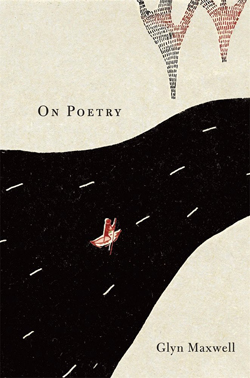On Poetry
by Glyn Maxwell
reviewed by Valerie Duff-Strautmann
If understanding poetry is to go beyond syllable count or formal definition, then how to talk about it? Through description of an organic whole, living metaphor, and illustration, according to Glyn Maxwell. On Poetry delivers a lively, highly personal conversation on craft, going deeper than most handbooks on the subject.
“Find out what time knows and you don’t,” Maxwell writes, describing the evolution of poetry in terms of the evolution of humans (“The best we can do to learn is to learn from what lasted . . . this survived because it was cunning, this survived because it was strong, this survived because it was lovely”). He reminds the reader of poetry’s imperative nature, “The Rime of the Ancient Mariner” being his main example. Poetry that survives, Maxwell explains, mimics “organisms that breathe and move and have, who one day horribly learn they can’t breathe or move or have forever.”
By invoking, among others, Coleridge, Auden, Dickinson, Thomas (Dylan and Edward), Hopkins, and ultimately Shakespeare, Maxwell provides teaching models—this is how rhyme works on a reader; this is how the white space shapes poetry; this is how the whiteness is a force equal to black type; this is what differentiates it from music or prose; this is the difference a revision makes both on the brain and the body (examining a revision of Wilfred Owen’s “Dulce Et Decorum Est”: “Feel the poor tongue and teeth trying to process what he’s seen”); this is how words push against memory.
Most of the knowledge offered is humorous, earnest, practiced. When he gently explains to an imaginary pupil that the dashes between Dickinson’s words are the timbers of the house she will never leave, it is easy to believe him. In addition to wide-ranging yet concise statements, perhaps aimed mostly at an intermediate poetry reader/writer, Maxwell points out the arbitrariness of any writing exercise, emphasizing the power of just getting someone to write—
—Choose a deck of cards and assign a situation to each.
—Take a line written by someone else and change it subtly but fundamentally.
—Write a poem with only certain vowels.
—Try couplets, play with line length, try terza rima—what’s the effect?
Essentially, he shows what can be gained by “learning” poetry, and what writers do for each other, since in a workshop, or in a book such as this one, “the poets discussing [one another’s work] are learning all the time.”
Unlike most other books on poetic craft, On Poetry turns, at the end, to a discussion of drama (Maxwell is both poet and playwright). The chapter called Space reveals why On Poetry was published first in the UK by Oberon Press, which specializes in books on the performing arts. The book is, in fact, as Maxwell claims, “for anyone”— not just for poets but also for those who want to write for the stage. By Maxwell’s own admission, “I’m not alone among the poets of today in having ventured into theatre, but I’m close to alone.” Poets, he notes, often steal from the greatest playwright of all, making a case for the power of verse drama.
If you can compose lines that breathe, an actor can say them. In fact, there is no single thing a young poet can do that is more useful than letting his or her lines pass through the mind and lungs and throat and lips of a well-trained actor. If you know your blackness and whiteness, your line-form and line-break, your meters and measures, how to ride and not be ridden, then you’re in—literally—good shape. You can deploy the breath and silence in ways prose writers (99% of playwrights) never learn to.
Maxwell also talks about how writers make a mark upon time. In sum, there is the body and brain, there is the text, there is the breath. The book offers pages of material to show the intricate crossovers of person to poem and poem to person. A wealth of anecdotes provide a rethinking of time and poetry—from the poet Mandelstam’s words being passed intact through the Stalin regime by his widow who memorized them, to the sillier but equally touching story of Robert Browning recording his own voice (“the first ever audio recording of poetry”). Browning speaking: “I shall remember all me life . . . this astonishing . . . by your wonderful invention! Robert Browning! Bravo bravo bravo! Hip hip hooray! Hip hip hooray!”
This is a book about craft, but it is also a book about motivation. Maxwell’s book allows the reader to see him or herself more clearly through words that have passed down through time, on paper or for the stage, bravo bravo bravo!
Published on June 24, 2014

